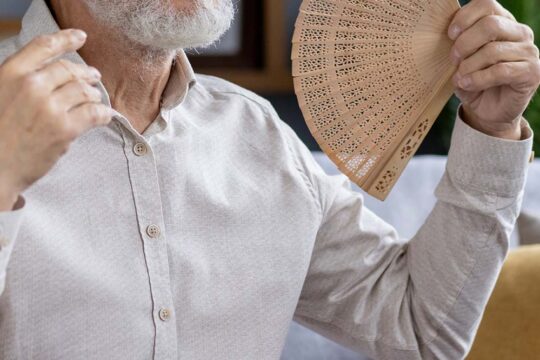
What to Know About Parkinson’s Disease & Dementia
Your Guide to Dementia with Parkinson’s Disease
Stellar Care is committed to upholding the dignity of your loved one who is struggling with Parkinson’s disease Dementia. We can provide the compassionate care they rightfully deserve. If you’ve noticed symptoms of this condition in your loved one, educating yourself about it can be beneficial. This knowledge will enable you to provide the essential support they need and develop a plan for their ongoing care.
What is Parkinson’s Disease Dementia?
Parkinson’s Disease Dementia (PDD) is a progressive neurodegenerative condition that can occur in people who have already been diagnosed with Parkinson’s disease (PD). People with PDD suffer from cognitive decline and significant impairment in memory, thinking, and other cognitive functions. PDD develops as Parkinson’s disease advances, often several years after initial motor symptoms appear.
What is the cause of Parkinson’s Disease Dementia?
PDD develops as Parkinson’s disease advances, often several years after initial motor symptoms appear. The exact cause of PDD is not fully understood, but it is believed to be related to the underlying brain changes associated with Parkinson’s disease, including the accumulation of abnormal protein deposits.
Symptoms of Dementia with Parkinson’s Disease
Symptoms of PDD can vary widely but may include memory problems, difficulty with executive functions, mood changes, and hallucinations. It can significantly impact a person’s quality of life and daily functioning, requiring specialized care and management.
How fast does Parkinson’s Disease Dementia progress?
The progression of Parkinson’s Disease Dementia (PDD) can vary significantly from person to person. Several factors influence the rate at which PDD progresses, including the person’s age at onset, the severity of their disease. motor symptoms, and overall health.
In some cases, PDD may develop gradually over several years, while in others, it can progress more rapidly. On average, PDD tends to emerge several years after the onset of PD motor symptoms, but this timeline can vary.
PDD is a progressive condition, meaning that cognitive and functional decline is expected over time. While there are treatments and interventions that can help manage symptoms and slow down the progression to some extent, there is no cure for PDD. Medical professionals and caregivers work closely with those diagnosed with PDD to provide the best possible care and support as the disease advances.
Stages of Parkinson’s Disease Dementia
Dementia in Parkinson’s disease progresses through various stages, with symptoms becoming more pronounced and debilitating over time. While the progression can vary, here is a general overview of the stages of PDD:
Mild Cognitive Impairment (MCI): In the early stage, individuals may experience subtle cognitive changes, such as mild memory problems, decreased attention span, and occasional difficulties with problem-solving and multitasking. These changes may not significantly impact daily functioning.
Early Dementia: As PDD progresses, cognitive impairments become more evident. Memory problems become more pronounced, and your loved one may have difficulty completing complex tasks and making decisions. Behavioral changes, like mood swings and apathy, can also occur.
Moderate Dementia: In the moderate stage, cognitive decline becomes more severe. Memory loss becomes prominent, and your loved one may have trouble recognizing familiar faces and places. Communication difficulties, including speech problems and difficulty finding the right words, can arise. Motor symptoms associated with Parkinson’s disease may also worsen.
Severe Dementia: In the late stages of PDD, individuals experience profound cognitive and functional impairments. They may become largely dependent on others for daily care, as they struggle with mobility, self-care, and communication. Hallucinations, delusions, and severe mood disturbances can occur.
Not everyone with Parkinson’s disease will develop PDD, and the rate of progression through these stages can vary significantly among individuals.
How to get a Parkinson’s Disease Dementia diagnosis
Diagnosing Parkinson’s Disease Dementia (PDD) typically involves a comprehensive evaluation by a neurologist or geriatric psychiatrist, who specializes in neurodegenerative conditions. Here are the general steps involved in obtaining a PDD diagnosis:
Medical History and Physical Examination: The process often begins with a detailed medical history interview, where the healthcare provider gathers information about the individual’s symptoms, medical history, medications, and family history. A thorough physical examination is also conducted to assess motor symptoms associated with Parkinson’s disease.
- Neuropsychological Assessment: A neuropsychological evaluation may be performed to assess cognitive function including a series of standardized tests that evaluate memory, attention, language, problem-solving, and other cognitive domains.
- Brain Imaging: Neuroimaging studies, like magnetic resonance imaging (MRI) or computed tomography (CT) scans, may be ordered to rule out other causes of cognitive decline and to evaluate the brain’s structure.
- Laboratory Tests: Blood tests may be conducted to rule out medical conditions that can mimic dementia or contribute to cognitive impairment, like thyroid disorders or vitamin deficiencies.
- Evaluation of Parkinson’s Disease: If your loved one has not already been diagnosed with Parkinson’s disease, an assessment of motor symptoms, including tremors, rigidity, and bradykinesia (slowness of movement), will be performed.
- Cognitive Assessment: Formal cognitive assessment tools, such as the Mini-Mental State Examination (MMSE) or the Montreal Cognitive Assessment (MoCA), may be administered to assess the severity of cognitive impairment.
- Assessment of Daily Functioning: The healthcare provider may inquire about the person’s ability to perform activities of daily living (ADLs) and instrumental activities of daily living (IADLs) to evaluate functional impairment.
- Differential Diagnosis: The healthcare provider will consider other potential causes of cognitive decline, like Alzheimer’s disease, Lewy body dementia, or Vascular dementia, and work to distinguish PDD from these conditions.
- Consultation and Collaboration: In some cases, a team of specialists, including neurologists, neuropsychologists, and geriatric psychiatrists, may collaborate to make a definitive diagnosis.
- Follow-Up and Monitoring: After a PDD diagnosis is established, ongoing monitoring and care management are crucial. Medications and therapies may be prescribed to manage symptoms and improve the individual’s quality of life.
It’s important for those experiencing cognitive changes to get a medical evaluation promptly, as early diagnosis and intervention can lead to more effective management and support for those living with Parkinson’s Disease Dementia.
Quality of life with Parkinson’s Disease and Dementia
Quality of life for individuals with Parkinson’s Disease Dementia (PDD) is significantly affected by a combination of motor and cognitive symptoms, including mobility limitations, memory issues, and mood changes. With proper care, therapy, and support, people with PDD can experience a better quality of life. Strategies include medication, therapy, emotional support, and a comfortable and safe living environment. It’s also wise to create a safety checklist where they are living. Despite challenges, moments of joy and connection with loved ones can be found, emphasizing the importance of comprehensive care and a nurturing environment.
Treatment for Parkinson’s Disease Dementia
Treatment for Parkinson’s Disease Dementia (PDD) involves a combination of medications, lifestyle modifications, and supportive care to manage both the motor symptoms of Parkinson’s disease and the cognitive decline associated with dementia. Here are some common approaches to treatment:
Medications:
- – Cholinesterase Inhibitors: These drugs, such as donepezil, rivastigmine, and galantamine, are commonly used to treat cognitive symptoms in PDD and may help improve memory and thinking abilities.
- – Dopaminergic Medications: Medications that increase dopamine levels, such as levodopa, are often prescribed to manage motor symptoms like bradykinesia, rigidity, and tremors.
- – Antipsychotic Medications: Antipsychotic drugs may sometimes be used to manage hallucinations, delusions, or severe behavioral disturbances, but they should be used with caution due to potential side effects.
- – Other Medications: Depending on symptoms, other medications may be prescribed to address mood disturbances, sleep problems, or other specific issues.
Physical and Occupational Therapy: Physical therapy can help individuals with Parkinson’s disease maintain mobility and manage motor symptoms. Occupational therapy focuses on maintaining daily living skills and independence.
Speech Therapy: Speech therapy may benefit those experiencing speech and swallowing difficulties, which can occur in advanced stages of PDD.
Cognitive Rehabilitation: Cognitive rehabilitation programs can provide structured exercises and strategies to help improve cognitive function and daily functioning.
Supportive Care: Providing a supportive environment is essential. Caregiver support and education can help family members and caregivers understand the condition and learn strategies for managing daily challenges.
Lifestyle Modifications: Healthy lifestyle habits, including a balanced diet, regular exercise, and social engagement, may help improve overall well-being and cognitive function.
Clinical Trials: Participation in clinical trials and research studies may offer access to innovative treatments and therapies being tested for PDD.
Assistive Devices: Assistive devices like mobility aids, communication devices, or home modifications may be recommended to improve quality of life.
While these treatments can help manage symptoms and improve quality of life, there is currently no cure for PDD. Treatment plans should be tailored to the person’s specific needs and may evolve as the condition progresses. Consistent follow-up with healthcare providers and specialists is essential to monitor the effectiveness of treatment and adjust it as necessary.
How to help someone with Parkinson’s Disease and Dementia
Supporting a loved one or an elderly parent who needs help with Parkinson’s Disease and Dementia requires a multifaceted approach. They need appropriate medical care, a safe living environment, and medication management. Establishing a consistent daily routine, promoting physical activity, and providing balanced nutrition are important. Communication is key, as is offering emotional support and engaging in cognitive stimulation activities. Caregivers should take care of themselves, seek occasional respite care, and address legal and financial planning. As these conditions progress, flexibility and adaptability in caregiving approaches are necessary, and consulting with healthcare professionals or specialized services is advisable.
At Stellar Care, we strive to provide compassionate support to both you and your loved one.
Related Articles
Types of Dementia and Dementia-Related Diseases
As people age, their bodies undergo various changes that can make them feel colder, even in moderately cool environments.
When an elderly person gets overheated they may feel excessively hot due to medications, thyroid issues, dehydration, decreased blood circulation, or hormonal changes.
Skin breakdown is a significant concern in elderly care and poses risks of pressure ulcers, infection, and serious complications.
The use of physical restraints is highly regulated in California to ensure the rights and dignity of residents are protected.
Our Services
Memory Care
Club Stellar
Dining
Activities

A Memory Care Community
4518 54th Street • San Diego, CA 92115
Phone: (619) 287-2920
LICENSE #374603625
Copyright © 2023 by Stellar Care | Website Development by blue media marketing, Inc.




